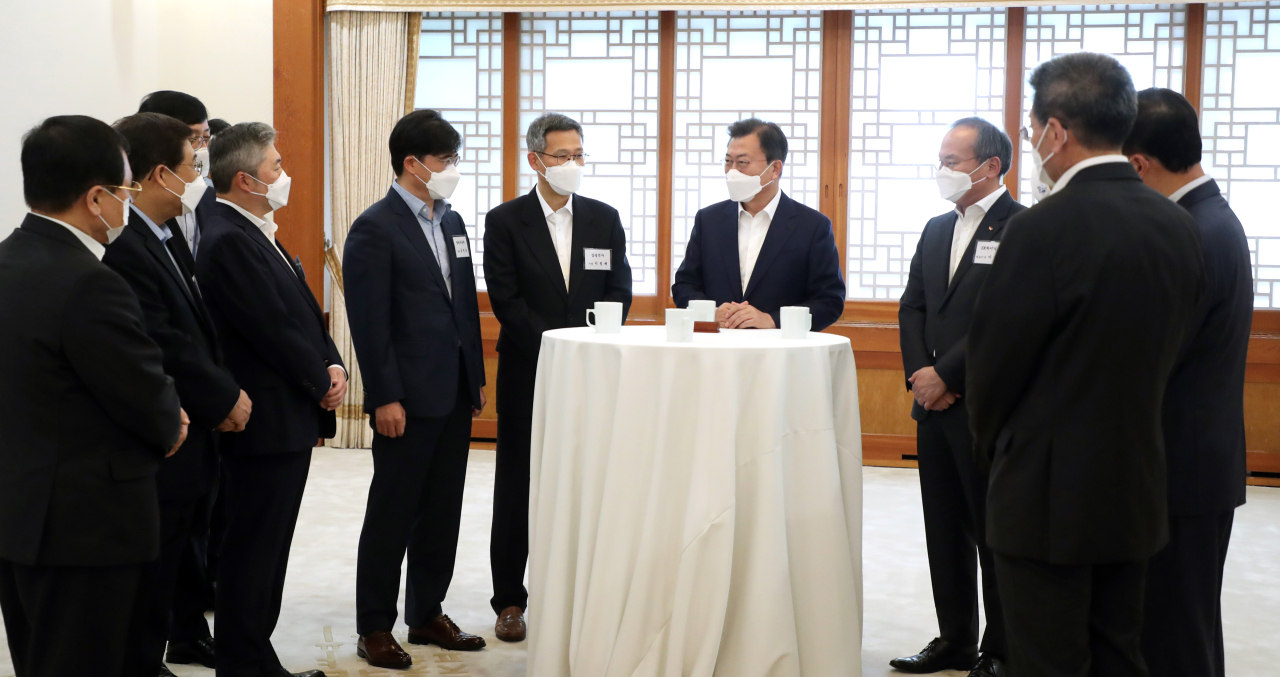President Moon Jae-in on Thursday stressed that South Korea must continue to lead the global chip supply chain and pledged support for the local semiconductor industry, amid the prolonged chip shortage and intensifying US-China trade tensions.
Moon called the semiconductor sector a “core national strategic industry” that will decide the country’s economy going forward, as he convened an “expanded meeting” of economy-related ministers at Cheong Wa Dae to tackle ways to support the country’s key sectors, including semiconductors, automobile manufacturing and shipbuilding.
The session was also attended by corporate leaders, including Samsung Electronics CEO Lee Jung-bae, who oversees the memory chip business; SK hynix CEO Lee Seok-hee; Hyundai Motor CEO Gong Young-woon; Korea Shipbuilding & Offshore Engineering CEO Ka Sam-hyun; Samsung Heavy Industries CEO Jung Jin-taek; and HMM CEO Bae Jae-hoon.
Moon said the global economy is going through a “colossal transformation,” with fierce competition among countries to dominate the global market as it recovers from the COVID-19 pandemic.
“The most visible rearrangement happening in the global supply chain is seen in the semiconductor industry,” Moon said at the start of the meeting. “The semiconductor sector is our nation’s core national strategic industry, which our economy’s present and future depend on. We must continue to lead the global semiconductor supply chain.”
To do so, the president pledged to come up with various measures to support the local chip industry in order to maintain the world’s No. 1 ranking and widen the gap with other countries.
Also touching on the auto industry, Moon pinned high expectations on the sector’s growth buoyed by a rapid increase in exports of electric vehicles, as well as rising demand for batteries. Moon also vowed to come up with a comprehensive strategy for Korea to lead the global battery market.
During the meeting, Moon asked the companies to expand investments and employment as much as possible, according to Cheong Wa Dae spokesman Kang Min-seok. Meanwhile, the executives requested the president’s and the government’s support for the industry and for deregulation.
Moon’s rare session comes as US President Joe Biden held a virtual meeting on tackling the global chip shortage Monday (local time), inviting executives from the semiconductor, auto and tech industries, including Samsung Electronics from Korea and TSMC from Taiwan.
During the meeting, Biden stressed the importance of the semiconductor industry and pledged to invest “aggressively” in the sector, amid an ongoing global shortage of chips that has wreaked havoc on supply chains in the automotive industry and tech firms.
Semiconductors have also been thrust into the center of a drawn-out US-China trade feud, as Washington appears to be building a potential “semiconductor alliance” of major firms among its allies that would help curtail China’s rise in the industry.
Biden’s call on chipmakers to beef up production on its soil poses complications for Samsung, the world’s leading chipmaker, which runs plants in both the US and China.
The Korean tech giant is reportedly seeking to build another foundry facility in the US, but the decision could upset China and could have an adverse impact on Korea’s business operations there, observers say.
Seoul has been pursuing “strategic ambiguity,” as tensions between the two superpowers run high over trade, technology and political issues. It has been trying to strike a delicate balance between its main security ally, the US, and its biggest trade partner, China. But as the rivalry intensifies, experts worry that Seoul’s diplomatic room for maneuvering between Washington and Beijing is becoming narrower.
Washington has been treating the semiconductor shortage as a national security issue, and the subject came up during the latest meeting between top security advisers from Korea, the US and Japan.
In response to intensifying global competition in the semiconductor industry that could affect local chipmakers, the Korean government is also considering its own measures to maintain the country’s leadership in the semiconductor market, known as the “K-semiconductor strategy.”
By Ahn Sung-mi (
sahn@heraldcorp.com)








![[Today’s K-pop] Blackpink’s Jennie, Lisa invited to Coachella as solo acts](http://res.heraldm.com/phpwas/restmb_idxmake.php?idx=644&simg=/content/image/2024/11/21/20241121050099_0.jpg)